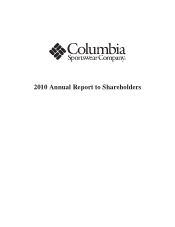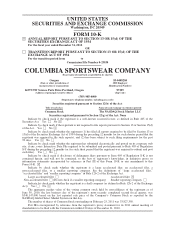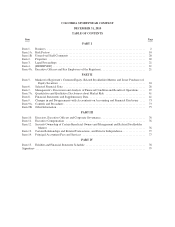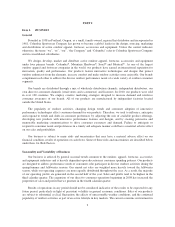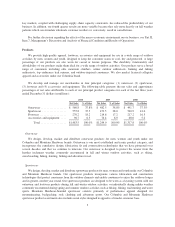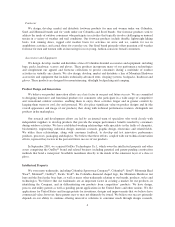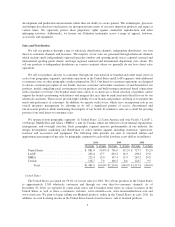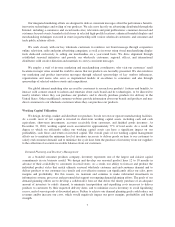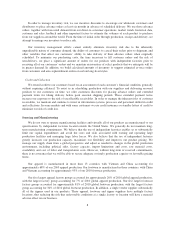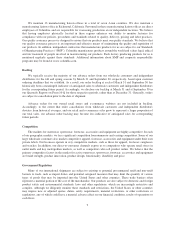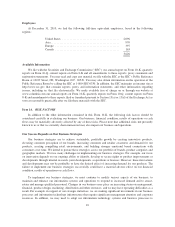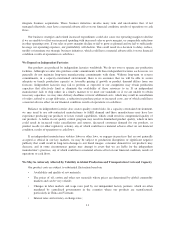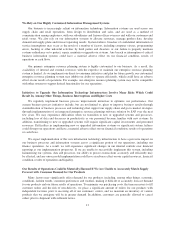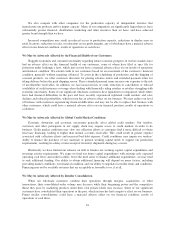Columbia Sportswear 2010 Annual Report Download - page 15
Download and view the complete annual report
Please find page 15 of the 2010 Columbia Sportswear annual report below. You can navigate through the pages in the report by either clicking on the pages listed below, or by using the keyword search tool below to find specific information within the annual report.We maintain 13 manufacturing liaison offices in a total of seven Asian countries. We also maintain a
manufacturing liaison office in Richmond, California. Personnel in these manufacturing liaison offices are direct
employees of Columbia, and are responsible for overseeing production at our independent factories. We believe
that having employees physically located in these regions enhances our ability to monitor factories for
compliance with our policies, procedures and standards related to quality, delivery, pricing and labor practices.
Our quality assurance process is designed to ensure that our products meet our quality standards. We believe that
our quality assurance process is an important and effective means of maintaining the quality and reputation of
our products. In addition, independent contractors that manufacture products for us are subject to our Standards
of Manufacturing Practices (“SMP”). Columbia manufactures products around the world and values legal, ethical
and fair treatment of people involved in manufacturing our products. Each factory producing products for us is
monitored regularly against these standards. Additional information about SMP and corporate responsibility
programs may be found at www.columbia.com.
Backlog
We typically receive the majority of our advance orders from our wholesale customers and independent
distributors for the fall and spring seasons by March 31 and September 30, respectively, based upon customer
ordering deadlines that we establish. As a result, our order backlog at each of March 31 and September 30 has
historically been a meaningful indicator of anticipated sales to wholesale customers and independent distributors
for the corresponding future period. Accordingly, we disclose our backlog at March 31 and at September 30 in
our Quarterly Reports on Form 10-Q for those respective periods, rather than at December 31. Generally, orders
are subject to cancellation prior to the date of shipment.
Advance orders for our owned retail stores and e-commerce websites are not included in backlog.
Accordingly, to the extent that order cancellations from wholesale customers and independent distributors
deviates from historical averages, and our retail and e-commerce sales grow to represent a larger proportion of
our total sales, our advance order backlog may become less indicative of anticipated sales for corresponding
future periods.
Competition
The markets for outerwear, sportswear, footwear, accessories and equipment are highly competitive. In each
of our geographic markets, we face significant competition from numerous and varying competitors. Some of our
large wholesale customers also market competitive apparel, footwear, accessories and equipment under their own
private labels. Our licensees operate in very competitive markets, such as those for apparel, footwear, sunglasses
and watches. In addition, our direct-to-consumer channels expose us to competitors who operate retail stores in
outlet malls and key metropolitan markets, as well as competitors who sell product online. We believe that the
primary competitive factors in the market for active outerwear, sportswear, footwear, accessories and equipment
are brand strength, product innovation, product design, functionality, durability and price.
Government Regulation
Many of our international shipments are subject to existing or potential governmental tariff and non-tariff
barriers to trade, such as import duties and potential safeguard measures that may limit the quantity of various
types of goods that may be imported into the United States and other countries. These trade barriers often
represent a material portion of the cost of the merchandise. Our products are also subject to domestic and foreign
product safety and environmental standards, laws and other regulations, which are increasingly restrictive and
complex. Although we diligently monitor these standards and restrictions, the United States or other countries
may impose new or adjusted quotas, duties, safety requirements, material restrictions, or other restrictions or
regulations, any of which could have a material adverse effect on our financial condition, results of operations or
cash flows.
9


